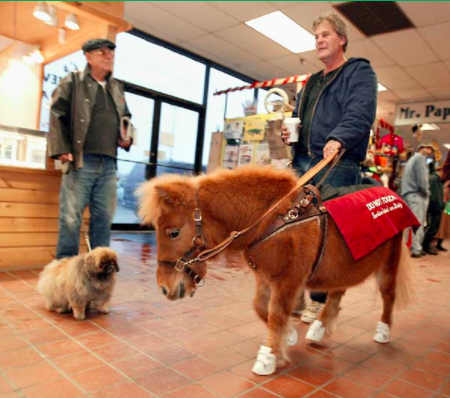During our Hostelling Across America Road Trip, we visited hostels that had a wide variety of policies towards service animals. Some hostels had an accurate understanding of their legal rights and obligations towards guests with animals. Other hostels have policies that if enforced, would violate the legal rights of their guests and could result in a legal judgement against the hostel. Every American hostel needs to properly understand the laws that relate to service animals.
Without a proper understanding, you expose your hostel to legal liabilities and you might also be making life harder for a person who is legitimately disabled. The most important law to understand when it comes to service animals is the Americans with Disabilities Act Title III Regulations. You can read 203 pages of legal jargon, or you can follow my handy decision tree!
Warning: I’m a hostel consultant; not an attorney. I’ve included links so that you can verify this information straight from the source. Also, you can call an ADA specialist at 800-514-0301. It’s free!
1) Is your hostel in the United States of America?
If not, I’m sorry but this article won’t help you!
If yes, read on.
Warning: The Americans with Disabilities Act is a federal law. In addition to this federal law, every state is allowed to make it’s own laws with regards to letting animals into your hostel. These state laws might be stricter than the federal law (i.e. the federal law might allow you to say “no” to a person with an animal at your hostel, but the state law might force you to say “yes.”). Please check your state’s laws, but know that all states must, at minimum, comply with the federal law. Let’s continue learning about the federal law.
2) Does your hostel have less than six rooms AND does the owner live onsite?
If yes, this article won’t help you. Your hostel does not meet the definition of a public accommodation. The ADA’s regulation on service animals applies only to public accommodation. Therefore, you are not required by the ADA to allow service animals in your hostel.
If not, read on.
3) Do you rent to guests for more than 30 days?
If yes, your hostel might actually be treated as housing instead of lodging. If that’s the case, the Fair Housing Act determines whether service animals can access your hostel, not the ADA.
If not, read on.
Now that you’ve answered the pre-requisite questions, from here on we can assume that your hostel is legally required to comply with the ADA. Now, if a guest shows up to your hostel with an animal in tow, here is how to determine if the ADA requires you to admit them.
4) Is the guest’s animal either a dog or a miniature horse?

If not, the ADA does not require you to accommodate the animal. A service animal is either a dog or a mini-horse. If a guest shows up with any other type animal, it is not a service animal. Period.
If yes, read on.
It is very unlikely that your hostel will encounter someone with a pet mini horse which they are illegitimately trying to pass off as a service animal. Therefore, for the rest of the article, I’ll be referring to service dogs.
Warning: A service dog can be any type of dog. You might think to yourself, “how can a dog that fits inside a purse be a service animal?” but it doesn’t matter. Any breed of dog can be a service animal.
5) Can you see the dog assisting someone who is clearly disabled?
(e.g., the dog is observed guiding an individual who is blind or pulling a person's wheelchair)
If yes, you must allow the service dog into your hostel without any questions.
If not, you’re allowed to start with the assumption that the dog is a pet and inform the guest of your pet policy.
6) If the guest tells you that the dog is not a pet, Ask “Is the animal required because of a disability?”
If the answer is “no,” the ADA does not require you to accommodate the dog. The ADA also doesn’t require you to admit service dogs in training.
Warning: You may not ask about the person’s disability or require any proof or documentation. This is just a yes or no question.
If the answer is “yes,” read on.
7) Ask, “What work or task has the animal been trained to perform?”
If the guest says that the dog just provides comfort or emotional support, it does not qualify as a service animal under the ADA. The ADA does not apply to emotional support animals or therapy dogs.
If the answer is a specific type of work or task, then you must allow the service dog into your hostel.
Warning: You may not require proof or documentation or ask the person to demonstrate the dog’s abilities. The ADA does not provide an exhaustive list of what animals are trained to do, but here are some examples they provide:
- guiding people who are blind
- alerting people who are deaf
- pulling a wheelchair
- alerting and protecting a person who is having a seizure
- reminding a person with mental illness to take prescribed medications
- calming a person with Post Traumatic Stress Disorder (PTSD) during an anxiety attack
You might be surprised to hear that service dogs might be used for something as simple as reminding a person to take medication. However, a hostel cannot question the necessity of the dog’s work, only whether the dog has been trained to perform a specific function.
Additional considerations regarding service dogs in hostels:
Allergies and fear of dogs are not valid reasons for denying access to people using service animals.
Some hostels mistakenly cling to a section of the ADA that states that they can deny service animals if they fundamentally alter the nature of the accommodations. Misinformed hostels will claim, “Given that hostels are a shared environment and some people don’t like dogs, the service dog alters the nature of the accommodation.” This is not a fundamental alteration!
A hostel provides beds, social activities, and various facilities. A hostel with service dogs still provides beds, social activities, and various facilities. The ADA uses a hospital operating room as an example of a place where a service animal could be excluded. The operating room is a sterile environment. If they allowed service dogs inside, it would no longer be sterile. Clearly, the bar for “fundamental alteration,” is set very high, and a hostel does not reach it.
You cannot require the guest to pay any extra fees or take any extra deposits because of the dog.
If a service animal damages anything in the hostel, you can charge the guest for the damage just like you would any other guest, but you cannot take an animal deposit or cleaning fee upfront.
You don’t have to offer a service dog any of your hostel’s amenities.
Hostels are required to grant access to service animals. They’re not required to provide the dog with water or food, or to allow service dogs on the furniture or in the swimming pool.
The service animal must be under the handler’s control at all times.
First, this means that guests cannot leave their service animals in the hostel for any period of time. Second, service dogs must always be on a leash, harness, or tether. The only exception is if it would interfere with the animal’s work or the individual’s disability. In that case, the guest must control the animal through voice, signal, or other effective controls.
You can ask a guest to remove the service animal from the premise...
If the dog is out of control and the handler does not take effective action to control it or the dog is not housebroken, you can make the guest remove the service dog from the hostel. However, you must still allow the guest to stay in the hostel without the animal present.
Best practices for Service Dogs in US Hostels
If you deny service to someone with an animal, it’s best to document the particulars of the situation
A dishonest person might try to change their story if you refuse to accommodate his or her dog. You might choose not to accommodate someone for a reason totally unrelated to their animal. Regardless of the circumstances, if you’re going to deny service to someone with an animal, it’s best to record the facts of the case. This could help your hostel in the future, should the person ever file a complaint against your hostel.
Given the liability risk, consider erring on the side of caution.
Because service animals are protected by the law, it’s important to handle these situations as delicately as you would any other legal matter. First, be cautious when making a judgement call in the gray areas. The ADA is a very long law, but it does not provide clear answers for every possible scenario. It would be prudent to train everyone in the hostel that when in doubt, it’s best to err on the side of the guest and their pooch. It would be better to be too lax in these situations, than to unintentionally violate the ADA and risk facing the consequences.
Second, even in situations that are black and white, far away from the gray areas, handling situations delicately will minimize the blowback towards the hostel. For example, if a service dog poops in your common room, you have every legal right to remove the animal, but you might decide not to do so, or to do so as courteously and gently as possible even if you’re screaming on the inside. Even when a hostel take justified actions, defending those actions in court could still be very costly. America has a reputation for being a litigious society, so when dealing with the ADA, try your best to tread lightly.
More resources for handling service animals in US hostels
The Americans with Disabilities Act, like many laws, is meant to make the world a better place, but still has its shortcomings. Now that we’ve made it to the bottom of the decision tree, you can understand why so many businesses misinterpret their rights and responsibilities when it comes to service animals. I wrote this guide in an effort to demystify the complexities of the law. For a more credible source, here is this 2-page brief, direct from the U.S. Department of Justice that should be easy to understand. This “lesson” from the ADA helped shed some light on the fundamental alteration ambiguity. Lastly, here are all 203 in depth pages of the Americans with Disabilities Act Title III, if you’d like to go straight to the source. Regardless of its complexity, it’s important that all hostel staff know how to handle service animals appropriately. It’s definitely frustrating to see some unscrupulous pet owners take advantage of the ADA, but we cannot allow them to make life harder for disabled people who legitimately benefit from the aid of a service animal.




